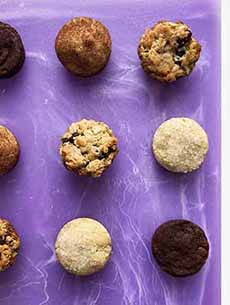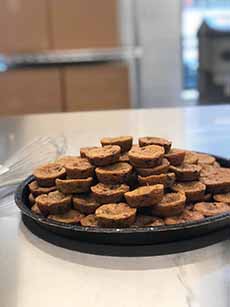Premium FOMO Gluten Free Cookies: No More Fear Of Missing Out
|
While we’re not constrained to a gluten-free diet, we have tried our share of GF cookies, looking for the best for THE NIBBLE. That our Top Pick of The Week is FOMO Baking Company, an artisan GF cookie line, shows how the best artisans can create cookies that everyone can enjoy—and that few would suspect were gluten free. The line of “cookie bites” is allergen-free (all of the top eight) and preservative-free; satisfyingly soft and chewy, come in six favorite flavors and are shipped directly FOMO*, Fear Of Missing Out, is what owner/baker Brittany Baker (yes, a baker named Baker†) experienced when diagnosed with celiac disease. She found many gluten-free cookies to have an off-putting cardboard taste and/or a disappointing texture. She saw that, while common food allergies were being addressed by numerous producers, most were addressing only one or two allergens. Plus, more than a few small producers were baking in shared kitchens, running the risk of cross contamination. Thus was born FOMO Baking Co., fresh-baked cookies to be treasured by the allergen-challenged as well as their friends and family. Formerly a high profile attorney, after experimenting she decided to devote herself full time to developing and perfecting FOMO’s recipes. FOMO’s cookies are free of gluten, eggs, dairy, peanuts, tree nuts, soy and shellfish (the latter of which you wouldn’t expect to find in a cookie, but it is one of the top eight allergens). Here’s more about the ingredients. The flavors include all the favorites: The cookies are available in: Either individual package or subscription, FOMO cookies are a great gift for anyone with food allergies. Head to FomoBaking.com. *While FOMO didn’t enter the OED until 2013, the phenomenon describing the anxiety was first identified in 1996 by a marketing strategist, Dr. Dan Herman. He published the first academic paper on the topic in 2000 in The Journal of Brand Management. Author Patrick J. McGinnis coined the term FOMO and popularized it in a 2004 op-ed in The Harbus, the magazine of Harvard Business School. Here’s more about it. †English names that represent professions—baker, carter, chandler (candle maker), cheeseman, clarke (clerk), cook, cooper, dyer, fisher, gardener, mason, miller, potter, shepherd, skinner, slater, smith, spinner, thatcher, tyler, weaver, webster (a female weaver), etc.—derive from olden times before people in the villages, which were small in population, needed surnames. As populations grew, they were called by their Christian names plus their profession’s name. |
|
|
|
|
||





